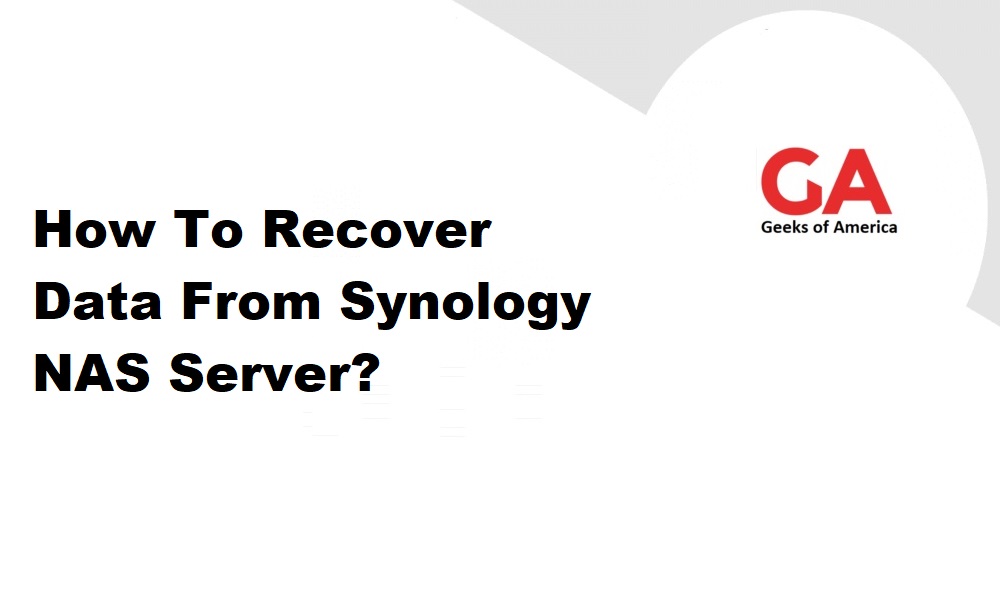Data loss can be a devastating experience, especially when it involves important files stored on a Synology NAS (Network Attached Storage) server. Whether it’s due to hardware failure, accidental deletion, or a system crash, recovering data from a Synology NAS requires a systematic approach. This guide will walk you through the step-by-step process of recovering data from a Synology NAS server, ensuring the best possible chances of successful data retrieval.

Section 1: Understanding Synology NAS
1.1. What is a Synology NAS?
A Synology NAS is a storage device that connects to a network and provides centralized file storage, backup, and sharing capabilities for multiple users or devices. It runs on Synology’s DiskStation Manager (DSM) operating system and offers a wide range of features and applications for data management.
1.2. Types of Data Loss Scenarios
Data loss can occur in various ways on a Synology NAS. Common scenarios include hardware failure, accidental deletion, file system corruption, disk failure in RAID arrays, and software or firmware issues. Understanding these scenarios helps in determining the appropriate data recovery methods.
Read Also : How To Recover Lost Data Using QuickBooks Auto Data Recovery Tool?
Section 2: Initial Steps Before Data Recovery
2.1. Identify the Cause of Data Loss
Before initiating the data recovery process, it’s essential to identify the underlying cause of data loss. This could be hardware-related, software-related, or user error. Understanding the cause helps in choosing the most appropriate recovery method.
2.2. Take Immediate Action
Upon discovering data loss, it’s crucial to take immediate action to prevent further damage. This includes disconnecting the NAS from power and network to avoid overwriting or corrupting data, as well as creating a plan for the recovery process.
2.3. Assess the Severity of Data Loss
Assessing the severity of data loss helps in prioritizing the recovery efforts. Determine the criticality of the lost data and identify if it’s a complete data loss or partial data loss. This evaluation assists in formulating an effective recovery strategy.
2.4. Backup Considerations
Evaluate the availability of recent backups for the data stored on the Synology NAS. If backups are available, consider restoring from them instead of undergoing a data recovery process. Backup strategies and best practices should be implemented to mitigate data loss risks.
Read Also : How To Fix Corrupt or Damaged QuickBooks Database Error?
Section 3: Data Recovery Methods
3.1. Basic Troubleshooting
Before diving into complex recovery methods, perform basic troubleshooting steps to ensure that the data loss is not due to a minor issue. This may include checking hardware connections, power supply, and network connectivity.
3.2. Synology Data Recovery Services
If basic troubleshooting doesn’t yield results, consider contacting Synology support for professional data recovery services. Synology offers specialized tools and expertise to recover data from various types of data loss scenarios.
3.3. DIY Data Recovery Techniques
If you prefer to handle the data recovery process yourself, there are several techniques you can employ. This section will cover accessing the Synology NAS via the web interface, using data recovery software, file system repair and reconstruction, rebuilding RAID arrays, and remote data recovery.
Read Also : How To Transfer Data Files From QuickBooks Online To QuickBooks Desktop?
Section 4: DIY Data Recovery Techniques
4.1. Accessing Synology NAS via Web Interface
Learn how to access the Synology NAS through the web interface to retrieve data from shared folders, check the status of disks, and perform basic file operations.
4.2. Using Data Recovery Software
Explore data recovery software options specifically designed for Synology NAS. These tools can help scan and recover lost or deleted files, even from formatted or damaged drives.
4.3. File System Repair and Reconstruction
In cases where the file system on the Synology NAS is corrupt or damaged, learn how to repair and reconstruct the file system to regain access to the stored data.
4.4. Rebuilding RAID Arrays
If the Synology NAS is configured with RAID arrays and experiences a disk failure, understand the steps to rebuild the arrays to restore data redundancy and retrieve lost data.
4.5. Remote Data Recovery
Discover remote data recovery techniques that involve connecting to the Synology NAS from another computer or device to access and retrieve data over the network.
Read Also : How To Recover Lost QuickBooks Data Files From Hard Drive?
Section 5: Synology Data Recovery Services
5.1. Contacting Synology Support
Learn how to contact Synology support for professional data recovery services. Understand the process, requirements, and available options for obtaining expert assistance.
5.2. Sending NAS for Professional Recovery
If the data loss situation is severe or complex, consider sending the Synology NAS to Synology or a professional data recovery service provider for specialized recovery procedures.
5.3. Costs and Limitations
Understand the potential costs and limitations associated with utilizing Synology data recovery services or external data recovery service providers.
Read Also : How to Recover Deleted QuickBooks Data Files?
Section 6: Best Practices for Data Recovery
6.1. Safeguarding Data before Recovery
Prioritize data protection by creating regular backups, implementing RAID redundancy, and following best practices for data management to minimize the risk of data loss.
6.2. Maintaining Data Integrity
During the recovery process, it’s important to ensure data integrity by avoiding overwriting or modifying existing data and verifying recovered data for accuracy and completeness.
6.3. Preventing Future Data Loss
Implement preventive measures such as regular backups, redundant storage configurations, monitoring system health, and keeping firmware and software up to date to prevent future data loss incidents.
Read Also : How To Install, Set Up and Update Intuit Data Protect to Backup Files?
Conclusion
In conclusion, recovering data from a Synology NAS server requires a systematic approach and understanding of the available recovery methods. By following the step-by-step process outlined in this guide and considering the best practices for data recovery, you can maximize your chances of successfully retrieving lost data from a Synology NAS. Remember to prioritize data protection and prevention strategies to mitigate future data loss risks.
